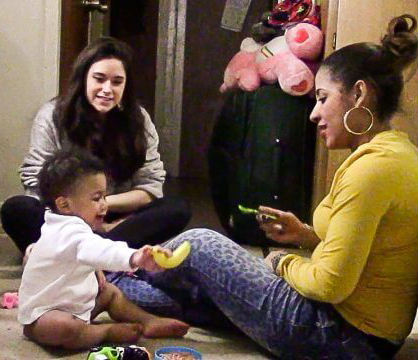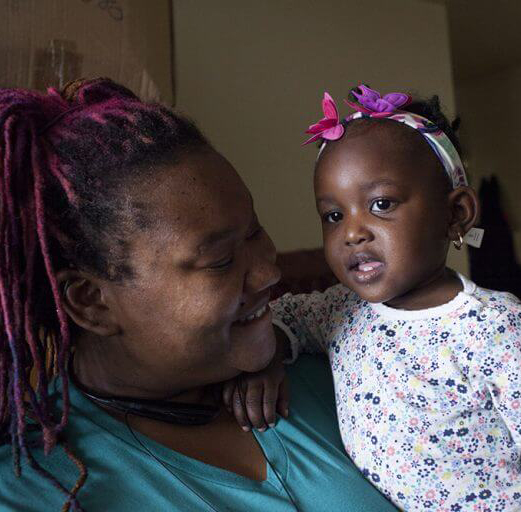Power of Two: Our Impact
As a social justice organization at our core, our partnerships with families occur at the intersection of education, health, wealth, and even the carceral system — helping families heal from intergenerational trauma by focusing on relationships between parents and children.
Nikaury & Liam

“That’s great, showing him that ‘atenciόn cariñoso’ that he needs. That shows him that, when anything happens, you’ll be there.”
Nikaury and her family were facing several systemic challenges that she worried would negatively impact her children’s development despite her best efforts.
Nikaury grew up in the Dominican Republic and came to the U.S. five years ago when her daughter, Sheiny, was two years old. The family prospered for a time, and then suffered a spiral of trouble — community violence, jobs lost, and Nikaury’s mother-in-law’s increasingly volatile behavior, ultimately ruining her son’s credit, threatening her and the children, and leading the family to seek shelter in the City’s homeless system.
Having experienced a loving and nurturing upbringing herself, Nikaury knew the importance of her role as a mom to now seven-year-old Sheiny, and eighteen-month-old son, Liam. Now, however, after a series of challenges, she was overwhelmed and worried that the many things out of her control would threaten her children’s well-being.
Nikaury learned about Power of Two while attending a parent-teacher conference at Sheiny’s school. “It’s been a challenge to manage everything happening in our lives,” Nikaury said. “I thought Power of Two could help me with Liam and his development. That’s why it interested me.”
With her limited English ability, Nikaury was assigned to Kat Castaño, a bilingual parent coach. At their first session of Power of Two’s program, “Attachment and Biobehavioral Catch-Up (ABC)”, Kat immediately saw Nikaury’s strengths in “dar atenciόn cariñoso” – that is, being nurturing when Liam was upset. Nurturance is one of ABC’s key targets because science has shown that it is a central ingredient for secure attachment.
Following the ABC model, Kat provided repeated positive comments throughout the ten sessions, reinforcing what Nikaury was doing well and further shaping her parenting behavior. In that first session, Kat commented, “He tripped and you say ‘Uh oh!’ That’s great, showing him that ‘atenciόn cariñoso’ that he needs. That shows him that, when anything happens, you’ll be there.” Not only did this simple, in-the-moment comment highlight Nikaury’s nurturing response to Liam, but it helped her understand why nurturance mattered. Over the course of ten weeks and countless such comments from Kat, Nikaury learned that her responses to Liam’s signals had the power to shape his development in ways she had never realized.
Using the ABC model, Power of Two provides ten sessions in the home, each an hour-long, with the coach providing the parent with focused, positive comments that help the parent nurture the baby when he or she is upset, follow the baby’s lead in the play, and refrain from frightening behavior. The coach also shares the research behind the program, explaining to the parent why these simple ways of parenting are so critical for a child’s brain development in infancy.
Asked recently about the impact of the program on her child, Nikaury said, “He has changed even in the way he plays. Before, if he didn’t want a toy or whatever if I didn’t understand, he cried or acted out. Now I understand him, and it makes it easier for him.”
Taniece & Miya

“For me, it was so rewarding to see all the little changes happening between Taniece and Miya, because I have learned how important that is for Miya’s future.”
“When I was growing up, it was different,” she recalled. “If you did something you were not supposed to do, you got popped.”
As a child, Taniece hadn’t always had someone respond to her needs and take care of her. Now, as a single mom with two children of her own, she was struggling with herself. The cycle of intergenerational trauma can be difficult to break without proper support.
In the past, Taniece had been skeptical of home-visiting programs where a professional works with a client in the home. She wasn’t sure she wanted a stranger in her apartment, afraid they would pass judgment on the condition of her home or tell her how to raise her child. After all, she already had an 11-year-old daughter.
“I was nervous,” she said, “because when you have someone coming into your home for the first time, and if your home is not nice, you think they will be judgmental of you.”
In the end, it was her baby Miya, just 18 months old, who made it happen, leading her to Power of Two.
As a child, Taniece hadn’t always had someone respond to her needs and take care of her. “When I was growing up, it was different,” she recalled. “If you did something you were not supposed to do, you got popped.” Now, as a single mom with two children of her own, she was struggling herself. It can be hard to give what you didn’t receive.
She is naturally nurturing,” Rosomond, the parent coach who worked with Taniece, said. “During one of our initial sessions, Miya bumped her head on the high chair and Taniece quickly walked over and comforted her.”
But Taniece struggled with following Miya’s lead, a critical parenting behavior that helps infants regulate stress hormones and allows their brains to develop fully. “She wouldn’t really interact with Miya during play.”
Following the Power of Two’s Attachment and Biobehavioral Catch-Up approach, Rosomond took note of every time Taniece responded to Miya in nurturing or responsive ways. Within minutes, Rosomond picked up on a simple interaction between Taniece and her daughter Miya. “Good following the lead!” said Rosomond, “She said ‘hi’ and you said ‘hi.’” Over the course of 10 weeks, Taniece heard simple, affirming comments like this over and over again—when she picked up Tamiya after she bumped her head when she laughed along as Miya pretended to eat a toy peach when she clapped when Miya clapped. Ordinary moments that had typically passed by unnoticed now were celebrated.
“By our eighth session,” said Rosomond, “Taniece was more attentive to what Miya was doing and played along with her, following her lead. During that session Miya walked over to Taniece with the play mac-and-cheese bowl; Taniece immediately lifted Miya onto her lap and they sat and pretended to eat the mac and cheese together. It was the first time that Miya sat on her mom’s lap to play. It was an emotional moment for all.”
When asked what Power of Two had done for her, Taniece said she’s become “extra patient” with her daughter.
She also said that she used to use her ordinary voice, which “at times can be rough, or maybe deep or harsh”; now, “I brighten it up when I speak with her because I’ve learned that children tend to react differently when you speak roughly versus sweet.”
When asked about Power of Two’s impact on this family, Rosomond said, “For me, it was so rewarding to see all the little changes happening between Taniece and Miya, because I have learned how important that is for Miya’s future.”
